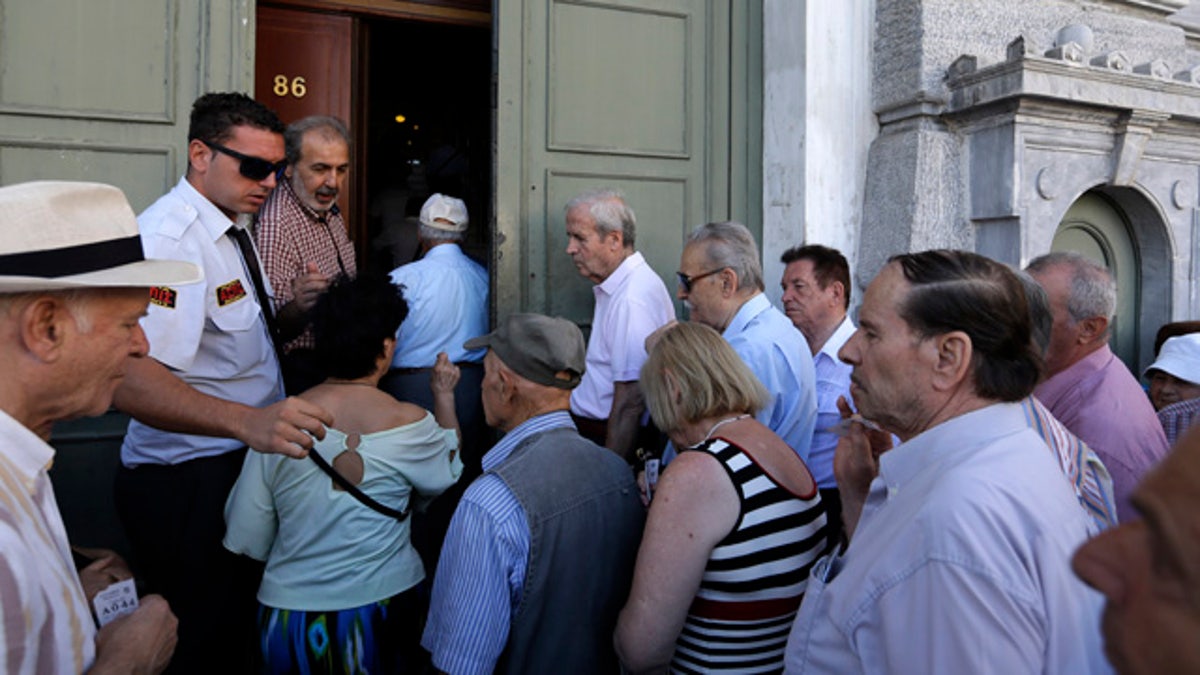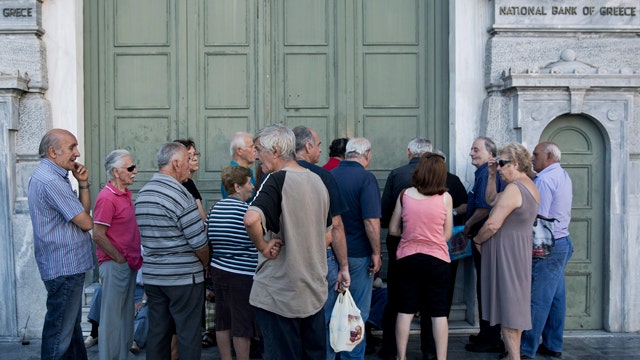Banks in Greece reopen following debt crisis
Banks open but still limiting customer withdrawals to $65 a day
ATHENS, Greece – Greeks woke up Monday morning to a new era: banks were finally open after being closed down for three weeks but new taxes meant coffee, tea and even condoms all cost more.
In downtown Athens, people queued up in an orderly fashion as the banks unlocked their doors at 8 a.m., taking a number and reading the paper as they waited for their turn at the till.
Many restrictions on transactions, including cash withdrawals, remained, however.
The Greek government kept the daily cash withdrawal limit at 60 euros ($65) but added a weekly limit of 420 euros ($455) that will be available beginning Sunday. This means depositors who don't make it to the bank on Monday to withdraw cash could pull out 120 euros ($130) on Tuesday instead, and so on, so Greeks don't have to feel they need to visit an ATM every day.
Bank customers will still not be able to cash checks, only deposit them into their accounts, and they will not be able to get cash abroad with their credit or cash cards, only make purchases. There are also restrictions on opening new accounts or activating dormant ones.

The first customers, most of them pensioners, enter a branch at the National Bank of Greece headquarters in Athens, Monday, July 20, 2015. Greek banks reopen on Monday morning, but many restrictions on transactions, including cash withdrawals, will remain. Also, many goods and services will become more expensive as a result of a rise in Value Added Tax approved by Parliament last Thursday, among the first batch of austerity measures demanded by Greece's creditors. (AP Photo/Thanassis Stavrakis)
Many goods and services also just became more expensive as a result of a rise in Value Added Tax approved by Parliament on Thursday, among the first batch of austerity measures demanded by Greece's creditors. Lawmakers also agreed to deep reforms in Greece's pension system including a gradual phasing out of all early retirement options.
The VAT rose from 13% to 23%, making some meats, cooking oils other than olive oil, cocoa, vinegar, salt, flowers, firewood, fertilizer, insecticides, sanitary towels and other basics all more expensive.
Services hit by the new VAT increases include restaurants and cafes, funeral parlors, taxis, cramming and tutorial schools -- very popular with Greek students seeking to make up for the deficiencies of the school system -- language institutes and computer learning centers. Public transport fares are expected to rise early next month.
On the bright side, the government pushed back the deadline for filing income taxes by a month to August 26.
Over the weekend, Greece's coalition government swore in its new, reshuffled cabinet, replacing five prominent dissidents from the radical left Syriza party, the senior coalition party. Four of them had voted against the agreement with Greece's creditors and the fifth had resigned before the vote.
The most urgent business for the reshuffled government is to pass another batch of austerity measures by Wednesday or early Thursday.
Greece closed its banks beginning June 29 to prevent a bank run as its second international bailout expired. After the Greek Parliament passed an agreement Thursday to seek a third bailout, the European Central Bank raised its emergency funding to the cash-strapped Greek banks.
Since Greece has a big loan payment due Monday to the ECB, plus arrears owed to the International Monetary Fund, the European Union decided Friday to release a short-term loan of 7.16 billion euros ($7.75 billion) to help Greece make those payments.

